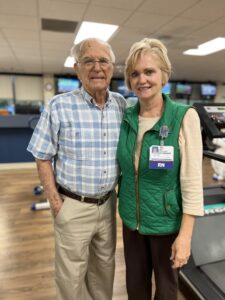Born into a world on the brink of war, Jim Jackson’s coming of age coincided with a tumultuous period in American history. After hearing about the bombing of Pearl Harbor on Dec. 7, 1941, Jackson, then 18 years old, was anxious to enlist as the U.S. entered World War II.
But fate dealt him a different hand. He was labeled “4F,” not qualified for military service, because of high blood pressure he developed after experiencing a heat stroke.
“I was fully devastated,” Jackson says, his voice tinged with sadness as he remembers. “I was patriotic and wanted to serve my country.”
Despite the setback, Jackson found a way to contribute, working in manufacturing plants that supported the war effort. One of them was shrouded in secrecy. At the X-10 plant in Oak Ridge, he quietly worked with others to build the technology that would help bring World War II to an end. His dedication and perseverance are hallmarks of those known as The Greatest Generation.
Moving Forward with Cardiac Rehabilitation
Today Jackson steps onto a treadmill at Methodist Medical Center’s cardiac rehabilitation facility in Oak Ridge. He walks at a brisk pace, and you would never guess his age. On April 22, 2024, Jackson celebrated his 100th birthday and his 2,352nd session at cardiac rehab.

Jim Jackson with Cora Deavours R.N., cardiac rehab
“I’ve got my regular routine here,” Jackson says. “I like to get on the treadmill, but I do the bicycle first.” With each step on the treadmill and each revolution of the ergometers and stationary bikes, Jackson defies the limitations of age and illness, one heartbeat at a time.
He’s one of many people making journeys of healing or renewal at cardiac rehab under the watchful eyes of medical professionals. “They’re wonderful,” Jackson says after finishing another set of exercises. “They care for people.”
Jackson’s high blood pressure never held him back – even as a teenager, he could outperform most of the boys his age in physical fitness. But a heart attack in 1988 led to a new perspective on his health.
“I was playing golf one day, and I felt a heaviness in my chest,” Jackson recalls, the memory still vivid. At first he thought he might have indigestion, but when his wife took him to Methodist Medical Center, a cardiologist got to the heart of the matter.
“I was operated on the next day,” Jackson says. “I had four bypasses.”
As if that weren’t enough, after the quadruple bypass procedure Jackson learned that his heart had been damaged in a car crash 14 years earlier. The impact to his side had pushed his heart out of position.
It was time to get moving.
“At home, if I’ve got my feet up in the air and it feels pretty good, I might just stay there,” Jackson says with a grin. That’s how he came to be a regular at MMC Cardiac Rehabilitation.
A Multi-disciplinary Approach to Heart Health
Heart disease remains one of the leading causes of death worldwide, but cardiac rehabilitation offers a way to improve heart health and overall well-being. Cardiac rehab uses a multidisciplinary approach that typically includes exercise, education and motivational support.
Cardiac rehab is beneficial for patients who have experienced a heart attack, heart surgery, heart failure or other cardiovascular conditions. Studies have shown that cardiac rehab participants have about a 30 percent lower mortality rate from cardiovascular disease, along with improved health factors and better ability to perform daily activities.
“We have treadmills, we have different kinds of bikes, we have weights,” says Sheila Doughty, manager of cardiopulmonary rehabilitation. Patients can work out on an elliptical machine, a recumbent cross-trainer or an ergometer. They can climb a specially constructed set of steps or walk an indoor path that’s just outside the cardiac rehab entrance. Nurses, an exercise physiologist and a respiratory therapist oversee the patients as they exercise, and a physician is always nearby.
The intensity and duration of exercise gradually increase as participants progress through the program. Meanwhile, they learn about heart health basics like nutrition, smoking cessation, stress management and managing medications.
Doughty says the heart of the program is the connection between people like Jackson and the cardiac rehab staff. “They are like a big family. I’ve had many patients tell me they feel comfortable because they feel safe.”
Doughty says the patients also develop friendships with each other as they grow stronger together. Jackson has experienced that friendship firsthand.
“To me, cardiac rehab here is a physical and a social thing as well,” Jackson says. “You meet friends here. I made a lady friend here and we go places together all the time.”
Jackson’s heart, scarred by heat, battered by tragedy and slowed by heart attack, continues to bear witness to his determination. He says he doesn’t know the secret to a long life, but he does know that God is good, and even when life doesn’t go as expected it’s worth living to the fullest.
If you have experienced heart disease, heart surgery or any heart emergency, talk to a healthcare provider to find out if cardiac rehab is right for you. It’s a great way to take the first step toward a stronger, healthier heart. Learn more about cardiac rehabilitation at Methodist Medical Center.
Headquartered in Knoxville, Tennessee, Covenant Health is a community-owned, healthcare enterprise committed to providing the right care at the right time and place. Covenant Health is the area’s largest employer and has more than 11,000 caregivers, clinicians and dedicated employees and volunteers.

